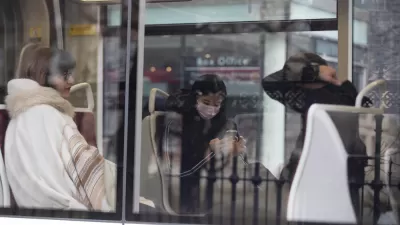Following the arrest of Dr. Tomislav Svoboda for obstructing the removal of Jarvis Street's bike lanes last November, the doctor and his colleagues have joined together to ask Toronto to speed up the installation of bike lanes to save lives.
In advance of a court appearance last week to face criminal charges for his role in protesting "the now-infamous removal of the Jarvis Street bike lanes," Dr. Tomislav Svoboda released an open letter signed by nearly two dozen of his colleagues that "asks city council to 'change lanes and save lives,' by speeding up the installation of bike lanes throughout the city," reports Desmond Cole.
"Svoboda, at his press conference, scolded city council for falling behind its own targets for bike-lane expansion (set in the 2001 bike plan), and for removing lanes even as major cities like Montreal, New York, and Chicago add dozens of kilometers of new bike thoroughfares each year. Citing the six cycling fatalities and thousands of injuries that have occurred in Toronto in 2012 alone, Svoboda said that what we usually describe as accidents 'could also be described as a failure by the City to protect its residents and to build a healthy city.' He urged councillors to consider the preventative benefits of cycling and active living in general. 'Cardiovascular health, mental health, insomnia—all these things are treated with exercise…this is a public health issue, and an issue of primary care,' said Svoboda."
So what punishment did Svoboda receive for his act of civil disobedience? He must perform 50 hours of community service with Cycle Toronto, a local bike advocacy group.
FULL STORY: Physicians Call for More Bike Lanes, More Quickly

Manufactured Crisis: Losing the Nation’s Largest Source of Unsubsidized Affordable Housing
Manufactured housing communities have long been an affordable housing option for millions of people living in the U.S., but that affordability is disappearing rapidly. How did we get here?

Americans May Be Stuck — But Why?
Americans are moving a lot less than they once did, and that is a problem. While Yoni Applebaum, in his highly-publicized article Stuck, gets the reasons badly wrong, it's still important to ask: why are we moving so much less than before?

Research Shows More Roads = More Driving
A national study shows, once again, that increasing road supply induces additional vehicle travel, particularly over the long run.

Judge Halts Enforcement of Anti-Homeless Laws in Grants Pass
The Oregon city will be barred from enforcing two ordinances that prosecute unhoused residents until it increases capacity and accessibility at designated camping sites.

Advancing Sustainability in Los Angeles County Schools
The Los Angeles County Office of Education’s Green Schools Symposium brings together educators, students, and experts to advance sustainability in schools through innovative design, climate resilience strategies, and collaborative learning.

Using Old Oil and Gas Wells for Green Energy Storage
Penn State researchers have found that repurposing abandoned oil and gas wells for geothermal-assisted compressed-air energy storage can boost efficiency, reduce environmental risks, and support clean energy and job transitions.
Urban Design for Planners 1: Software Tools
This six-course series explores essential urban design concepts using open source software and equips planners with the tools they need to participate fully in the urban design process.
Planning for Universal Design
Learn the tools for implementing Universal Design in planning regulations.
City of Moreno Valley
Institute for Housing and Urban Development Studies (IHS)
City of Grandview
Harvard GSD Executive Education
NYU Wagner Graduate School of Public Service
City of Cambridge, Maryland
Newport County Development Council: Connect Greater Newport



























